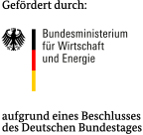The BEAM-ME Project
Implementation of acceleration strategies from mathematics and computational sciences for optimizing energy system models.
Background
Energy system models (ESM) are widely used in research and industry to analyze todays and future energy systems and potential pathways for the European energy transition. Current studies address future policy design, analysis of technology pathways and of future energy systems. To address these questions and support the transformation of today’s energy systems, ESM have to increase in complexity to provide valuable quantitative insights for policy makers and industry. Especially when dealing with uncertainty and in integrating large shares of renewable energies, ESM require a detailed implementation of the underlying electricity system. The increased complexity of the models makes the application of ESM more and more difficult, as the models are limited by the available computational power of today’s decentralized workstations. Severe simplifications of the models are common strategies to solve problems in a reasonable amount of time – naturally significantly influencing the validity of results and reliability of the models in general.
Solutions for Energy-System Modelling
Within BEAM-ME a consortium of researchers from different research fields (system analysis, mathematics, operations research and informatics) develop new strategies to increase the computational performance of energy system models and to transform energy system models for usage on high performance computing clusters. Within the project, an ESM will be applied on two of Germany’s fastest supercomputers. To further demonstrate the general application of named techniques on ESM, a model experiment is implemented as part of the project. Within this experiment up to six energy system models will jointly develop, implement and benchmark speed-up methods. Finally, continually collecting all experiences from the project and the experiment, identified efficient strategies will be documented and general standards for increasing computational performance and for applying ESM to high performance computing will be documented in a best-practice guide.
Contact Information
Funding Body: Federal Ministry for Economic Affairs and Energy
Project ID: 03ET4023A-F
Programme: 6th Energy Research Programme of the Federal Goverment
Funding Agency: PTJ, point of contact: Dr. Thorsten Fröhlich
Total funding: 3,3 Mio. Euro
Time frame: 12/2015 bis 6/2019
Coordinator and point of contact: Dr. Benjamin Fuchs


